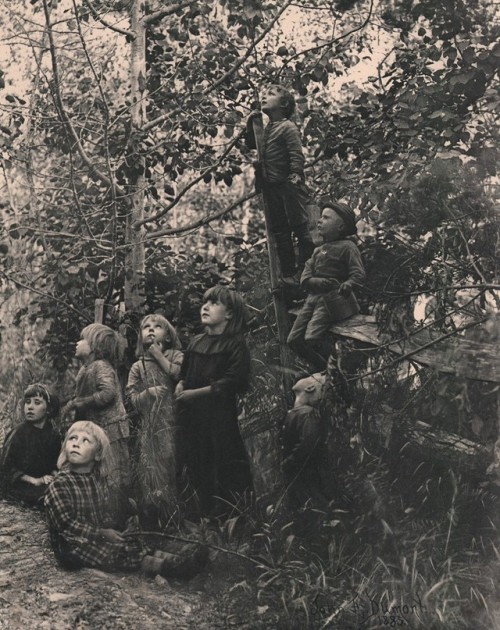
This charming photograph ‘Listening to the Birds’ was taken by the American photographer John Dumont in 1892. Yet, I turn today, closer to home, to focus on a very short poem by the English poet, Charlotte Mew – ‘I so liked Spring…’
[* A ‘thrush’ is a common British bird. Mew is probably referring specifically here to the ‘Song Thrush’, so named for its distinctive song]
I so liked Spring last year
Because you were here; –
The thrushes too –
Because it was these you so liked to hear –
I so liked you.
This year’s a different thing, –
I’ll not think of you.
But I’ll like the Spring because it is simply Spring
As the thrushes do.
It is extremely difficult to write as simply as that. The genius of its simplicity reminds me of Wordsworth’s Spring poem ‘Daffodils’ and perhaps the most famous (and simple) opening line of any poem in the English language ‘I wandered lonely as a cloud’. The speaker in Mew’s poem is certainly lonely here, the sound of birdsong recalling a lost love who this year she promises not to think of. But, of course, the poem deliberately trembles on the edge of this contradiction: By saying ‘I’ll not think of you’, of course, she is.
Although it is sometimes misleading to confuse the poem’s voice with the poet themselves, Mew’s own romantic life was characterised by heartbreak and unrequited longing, culminating in disappointment and suicide. Repressed by the narrow restrictions of the time in which she lived, she channelled her passionate and romantic nature into her work – it’s what gives her poetry such an electrical charge, although it might be difficult to see here in the understated quietness of this particular poem.
Charlotte Mew (1869-28) shares much in common (both on and off the page) with another great English poet of unrequited love A. E. Housman (1859-36). In Tom Stoppard’s wonderful play about Housman ‘The Invention of Love’, he stages a totally fictional meeting between Housman and Oscar Wilde. Wilde berates Housman for his timidity in matters of the heart, his repression and lack of courage, then, in leaving, turns to him and says “but you wrote the poems. How can you be sad when you know you wrote them?”
It’s what I would have liked to have said to Charlotte Mew.


